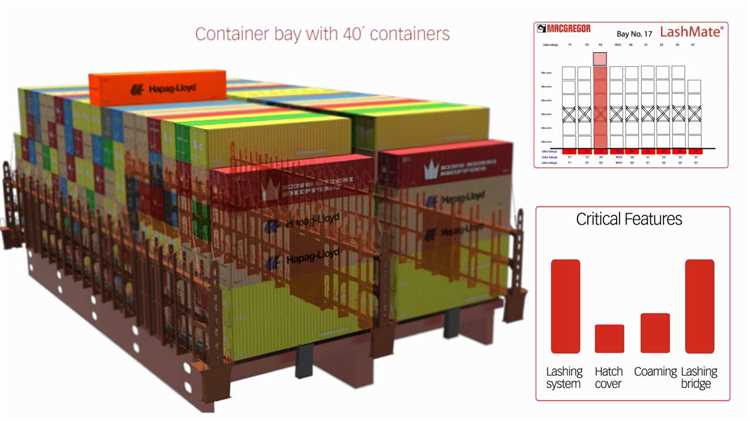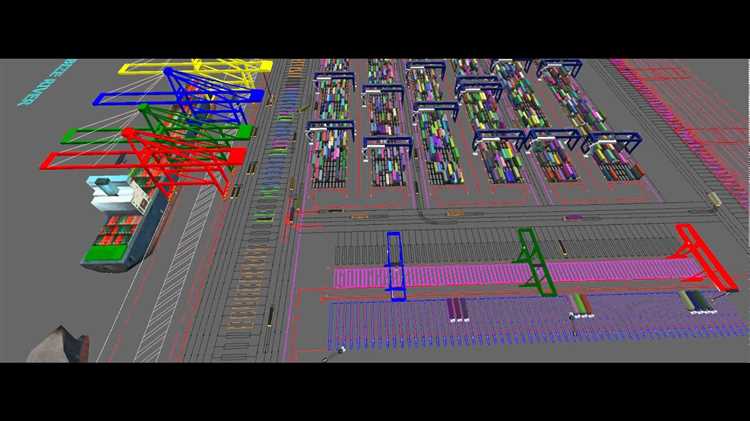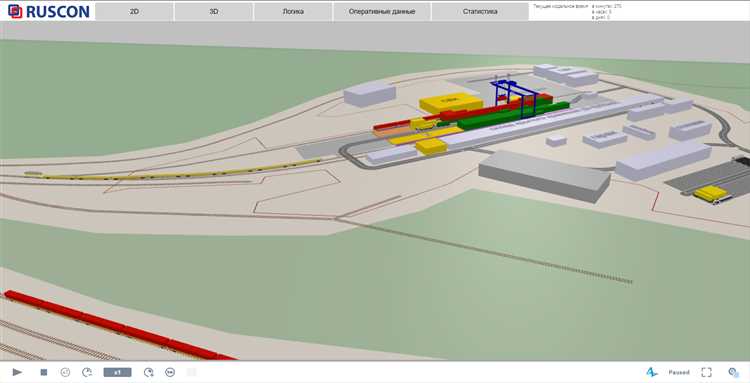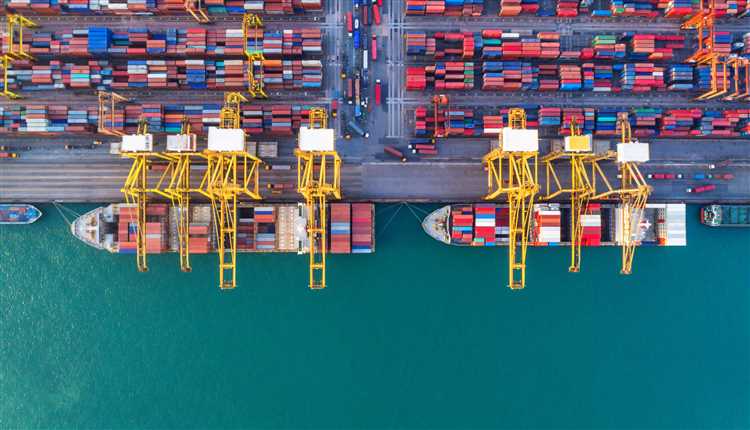Contpark specializes in offering a robust terminal management solution. Its platform includes features for real-time visibility, workflow automation, and security, simplifying terminal operations and increasing productivity.

In today’s fast-paced world of intelligent transportation systems, container terminal operations are becoming more complex and challenging. The demand for efficient and effective cargo transportation has never been higher, and the industry is constantly seeking innovative solutions to optimize terminal operations.
Container terminal simulation software is one such solution that is emerging as a game-changer in the field of terminal management. By utilizing advanced algorithms and real-time data, this software allows terminal operators to simulate various scenarios and make informed decisions to enhance their operations. From forecasting container vessel arrivals to scheduling truck and rail movements, terminal simulation software provides the intelligence needed to improve efficiency and reduce risks.
With terminal simulation software, port managers can optimize their terminal stacking and storage processes, ensuring that containers are unloaded and loaded in the most efficient and safe manner. By analyzing traffic patterns and adapting to market demands, the software can ensure that container operations are performed with the highest level of adaptability and quality.
Moreover, terminal simulation software also enables shipping logistics and industry stakeholders to collaborate effectively, ensuring better interoperability in the transportation process. By providing a platform for real-time communication and data sharing, the software enhances the overall efficiency of the shipping ecosystem and promotes higher standards in shipping technology.
In conclusion, container terminal simulation software is a transformative tool for the shipping industry. By optimizing terminal operations and enhancing container operation efficiency, this software enables port and logistics managers to streamline their processes and improve overall performance. With its ability to forecast market demands, adapt to changing conditions, and ensure safety standards, terminal simulation software is an essential component of modern shipping management and logistics.
What is Container Terminal Simulation? Container Terminal Simulation is a powerful tool that utilizes advanced logistics software to model and simulate the entire process of handling containers in a terminal. It provides a detailed analysis of various factors involved in container operations, such as trucking, warehousing, terminal loading, and terminal management software. By accurately simulating the movements and interactions of trucks, machines, and other resources, terminal simulation helps optimize performance and efficiency, enhance safety, and improve collaboration among stakeholders.
Terminal Simulation Service: Terminal simulation services offer comprehensive solutions for port handling and container terminal management. Using cutting-edge software and simulation models, these services enable terminal operators to visualize and analyze their operations, identify bottlenecks, and optimize resource utilization. By simulating various scenarios, they can test the impact of different strategies and improve efficiency in yard operations, trucking services, and terminal loading processes. Additionally, terminal simulation services help ensure security and safety measures, as well as enhance intermodal logistics and sustainability in container operations. By leveraging simulation technology, terminal operators can stay ahead of competitors and make data-driven decisions to optimize their operations.
Using a terminal simulation service can help optimize traffic flow within a container terminal. By modeling and analyzing different scenarios, the service can provide insights on how to improve the movement of containers, reducing congestion and improving overall efficiency.

Terminal simulation services use advanced forecasting techniques and predictive analysis to provide accurate and reliable predictions for container movements and port handling. This allows terminal operators to better plan their resources, optimize their operations, and anticipate any potential issues or bottlenecks.
By simulating the operation of various equipment, such as cranes and container trucks, terminal simulation services can help determine the optimal maintenance schedule and resource allocation. This ensures that equipment is properly maintained, reducing downtime and optimizing the utilization of available resources.

Terminal simulation services can also simulate the entire port transport and intermodal logistics process. This allows terminal operators to evaluate the efficiency of different transportation modes, such as ships or trains, and identify ways to improve the coordination and integration of these modes to streamline the overall logistics management.


Terminal simulation services utilize advanced simulation modeling techniques to create accurate and realistic representations of container terminal operations. These models consider various factors such as container traffic, port handling, and equipment performance, allowing operators to simulate and analyze different scenarios.
Terminal simulation services offer optimization and control capabilities to help terminal operators find the most efficient and cost-effective solutions. By analyzing data from sensors and integrating with terminal management software, these services can provide real-time insights and recommendations for optimizing operations and making informed decisions.
Terminal simulation services adhere to industry standards and ensure the highest level of quality in their simulations. By following best practices and utilizing accurate data, these services provide reliable results and valuable insights for terminal operators to improve their operations and meet industry standards.
By leveraging simulation technology and advanced analytics, terminal simulation services help facilitate the digital transformation of container terminals. They enable terminal operators to automate processes, improve efficiency, and enhance decision-making through data-driven insights and analysis.
Terminal simulation services provide detailed analysis and optimization techniques to improve shipment handling and container flows. By simulating different scenarios and analyzing the data, these services help identify bottlenecks, optimize storage and handling procedures, and improve overall shipment efficiency.
The transformation of port operations through advances in technology and communication has led to the development of innovative solutions such as Terminal Simulation Service. This service utilizes machine intelligence and port automation to optimize port planning and improve operation efficiency.
By simulating various scenarios, Terminal Simulation Service allows port operators to make informed decisions regarding resource allocation, container handling, and truck transportation. This logistic automation not only enhances decision-making but also streamlines the entire cargo transportation process.
With Terminal Simulation Service, port operators can analyze and optimize crane operation, trucking management, and container logistics to maximize port capacity and reduce turnaround time. This service offers a comprehensive approach to port technology management, ensuring that port operations run smoothly and efficiently.
By improving the unloading and container operation efficiency, Terminal Simulation Service enables port operators to provide better service to their partners. This, in turn, fosters stronger relationships and promotes collaboration in the industry. Port operators can stay ahead of their competitors by utilizing this innovative service to optimize their operations.
Overall, Terminal Simulation Service is a game-changing tool in the field of port operation. By leveraging port automation and resource optimization, this service enhances operation efficiency, improves communication within the supply chain, and drives productivity in the freight transportation industry.
The optimization of container handling processes is crucial in the efficient operation of a container terminal. Terminal simulation services provide a valuable tool for stakeholders and partners in the terminal logistics industry to enhance their operations. By utilizing advanced technologies and predictive analytics, terminal simulation services enable better decision-making and control over various aspects of container handling.
One area where terminal simulation services bring significant improvements is in inventory management. Through real-time monitoring and analysis, stakeholders can gain better visibility into container movement and utilization, allowing them to optimize storage capacity and minimize inventory surplus. This not only improves efficiency but also reduces costs and enhances compliance with shipping regulations.
Collaboration and partnerships play a vital role in achieving optimal terminal logistics. Terminal simulation services facilitate collaboration between different stakeholders, such as shipping companies, freight logistics providers, and terminal operators. By simulating various scenarios and sharing data, these parties can work together to identify bottlenecks, optimize yard operations, and enhance the overall flow of containers within the terminal and to/from the shipyard.
The emergence of robotics and automation in the logistics industry has also transformed container handling processes. Terminal simulation services provide a platform for testing and optimizing the integration of robotics and automated systems within the terminal. By simulating different robotic scenarios, stakeholders can identify the most efficient and effective methods of utilizing robotics for tasks such as container loading and transport.
Furthermore, terminal simulation services enable terminal operators to visualize and analyze the impact of shipping technology advancements on their operations. By simulating the integration of new technologies, such as autonomous vessels and smart containers, stakeholders can proactively adapt their terminal logistics to accommodate these innovations. This proactive approach ensures that terminal operators stay ahead of the market and are prepared for future industry transformations.
In summary, terminal simulation services play a crucial role in enhancing container handling processes. By providing real-time monitoring, predictive analytics, collaboration platforms, and simulation capabilities, they empower stakeholders to optimize their inventory management, improve compliance, enhance collaboration, integrate robotics, adapt to new shipping technologies, and make informed decisions for more efficient and effective terminal logistics.
In the fast-paced world of port automation and logistics software, effective communication and efficient modeling are crucial for optimizing operations. This is why Terminal Simulation Service plays a vital role in streamlining yard planning and truck dispatching.
With real-time data, the intelligence of the terminal management software allows for predictive and cost-saving decision-making. By analyzing vessel arrivals and departures, container storage yard availability, and truck logistics, the service ensures smooth operations and optimal resource allocation.
The implementation of automation and robotics in the yard management further enhances efficiency and improves the quality of container operation. This not only saves costs but also maximizes security and minimizes environmental impact.
Through the integration of artificial intelligence and port technology, the terminal simulation service offers a comprehensive solution for marine logistics. It optimizes truck flow and dispatches, minimizing waiting times and maximizing throughput.
Warehouse logistics are also streamlined through the terminal simulation service, as it provides real-time visibility into container movements and inventory. This allows for better planning and coordination, reducing delays and improving overall efficiency.
In conclusion, the terminal simulation service is an essential tool for optimizing yard planning and truck dispatching in the shipping industry. Through its advanced technology, it enables efficient communication, predictive decision-making, and streamlined operations. By leveraging automation, robotics, and artificial intelligence, it ensures cost-saving, security, and environmental benefits.Emphasizing the importance of effective yard and truck management in the port industry, this service contributes to the overall success of container terminals and enhances the competitiveness of the logistics sector.
The efficient management of container dwell time is crucial for optimizing the performance of container terminals. Through the use of terminal simulation service, operators can minimize dwell time by implementing automation and standardized container management practices. This service enables improved communication and coordination between different stakeholders involved in the terminal operation, such as truck transportation, railway, and warehouse management. By utilizing sensors and monitoring systems, terminal operators can track and analyze container movements, reducing the risk of delays and improving overall operational efficiency.
The terminal simulation service also offers opportunities for innovation in container port optimization. By simulating various scenarios, terminal operators can identify bottlenecks and find ways to optimize yard operations and terminal handling. The service enables the transformation of data into actionable insights, allowing operators to make informed decisions regarding inventory management, transportation planning, and storage allocation. Through the use of terminal optimization software, operators can improve the efficiency of their operations, leading to reduced costs and increased customer satisfaction.
Emerging technologies and innovations in the field of container terminal simulation provide additional opportunities for minimizing container dwell time. By integrating warehouse management systems with terminal management software, operators can streamline the flow of containers throughout the entire supply chain. This integration enables real-time tracking and efficient planning of container movements, ensuring timely delivery and reducing the risk of delays or disruptions.
In conclusion, the terminal simulation service plays a vital role in minimizing container dwell time and optimizing terminal operations. By implementing automation, standardized practices, and innovative technologies, terminal operators can enhance their performance and improve overall efficiency. The service offers opportunities for optimization in various aspects, including yard operations, inventory management, and transportation planning. Through the use of simulation and data analysis, operators can make informed decisions and mitigate risks, leading to improved customer satisfaction and increased competitiveness in the market.
In the fast-paced and dynamic world of port logistics, efficient resource allocation and utilization are crucial for optimizing operations. By using advanced software solutions such as terminal simulation service, ports can achieve sustainable and efficient management of port traffic, cargo logistics, and container handling.
Terminal simulation service provides a comprehensive tool for modeling and analyzing various aspects of port operations. It integrates with existing logistics software and enables port optimization by simulating scenarios and providing insights into resource allocation and utilization. This allows port operators to identify bottlenecks and inefficiencies in their processes and take appropriate actions to improve performance.
One of the key trends in port logistics is the increasing use of logistic automation. Terminal simulation service plays a vital role in this trend by facilitating the integration of automated machines and systems into the port operations. It helps in optimizing the allocation and utilization of these machines, such as automated stacking cranes, to ensure smooth and efficient container storage and retrieval.
Effective resource allocation and utilization is not limited to the port area alone. Terminal simulation service also considers the entire supply chain, including railway and marine transportation. By analyzing the movements of containers and forecasting demand, it helps in optimizing the allocation of resources at various stages of the cargo logistics process.
Furthermore, terminal simulation service supports efficient warehouse management by providing insights into inventory management and container tracking. It enables benchmarking and analysis of port performance and helps in identifying areas for improvement. By optimizing container management and reducing dwell time, ports can enhance their productivity and customer service.
With its advanced modeling capabilities and data-driven approach, terminal simulation service brings efficiency and sustainability to port logistics industry. It enables ports to make informed decisions, optimize resource allocation and utilization, and improve their overall operational performance. By leveraging this powerful tool, ports can stay competitive in the ever-changing landscape of container terminal operations.
The efficient management of terminal operations is crucial for the success of container ports. One way to reduce operational costs and improve overall performance is by utilizing terminal simulation services. Terminal simulation service allows port operators to simulate various scenarios and optimize their operations, trucking management, and port operation efficiency. By simulating different container handling strategies and analyzing the results, operators can identify areas for improvement and make informed decisions.
In today’s dynamic and rapidly changing industry, terminal simulation offers valuable insights into the container port’s performance and helps identify bottlenecks and potential inefficiencies. It allows operators to evaluate different aspects of the terminal’s operations, such as container storage, stacking, trucks, and maintenance, and find the most cost-effective solutions. Furthermore, terminal simulation enables a better understanding of vessel logistics and port transport, improving the resilience of the port’s operations.
Digitalization and port technology management are emerging trends in the industry, and terminal simulation plays a crucial role in this process. By utilizing advanced software and connectivity, terminal service providers can analyze vast amounts of data and optimize the allocation of resources. This leads to more efficient truck transportation logistics, reduced waiting times, and improved overall port performance. Terminal simulation also helps in identifying opportunities for process automation, which further enhances operational efficiency and cost-effectiveness.
The logistic service industry is constantly evolving, with container handling being an integral part of terminal operations. To ensure efficient and safe handling of containers, training plays a crucial role. One innovative solution that has proven to be effective is the use of terminal simulation services.
By utilizing advanced simulation technology, terminal operators can create virtual environments that replicate real-life scenarios. Machine simulation allows operators to train their staff on various tasks, such as port unloading, trucking management, and logistics management. This training not only enhances the skills of employees but also ensures that they are well-prepared to handle any challenges that may arise in their day-to-day operations.
Safety is a top priority in container terminal operations. With the help of simulation, stakeholders can identify potential hazards and implement preventive measures to reduce accidents and maintain a safe working environment. For example, crane and ship container simulations can help optimize equipment maintenance schedules, ensuring that all machinery is functioning properly and minimizing the risk of equipment failure.
Furthermore, simulation can improve overall port efficiency and transport logistics by providing real-time data and intelligence. Terminal optimization can be achieved by analyzing the data generated from the simulation, allowing operators to make informed decisions regarding resource allocation, inventory management, and container operation efficiency. This level of intelligence enables terminal operators to respond promptly to changing conditions and overcome challenges.
By embracing the use of terminal simulation services, container terminal operators can enhance safety, increase port efficiency, and improve logistic automation. This transformative technology fosters a secure environment for employees, streamlines terminal operations, and ultimately contributes to the success of the entire logistics industry.

A container terminal operates as a critical element in the logistic service of a supply chain management system. To enhance the efficiency and effectiveness of container terminal operations, real-time monitoring and decision support systems are essential. By utilizing advanced automation technology, such as machine learning and internet of things, container terminals can optimize their unloading, stacking, and maintenance processes.
Innovations in digitalization have brought about significant improvements in terminal management. With the help of terminal simulation services, container terminals can efficiently plan and schedule the movement of containers in the container shipyard. This technology not only streamlines transportation logistics but also ensures the smooth flow of goods from the port to the truck transportation and vice versa.
Terminal simulation services provide real-time monitoring of container handling operations, allowing terminal operators to proactively identify and address any potential risks. This predictive capability helps in compliance with environmental regulations and ensures the safety of container handling personnel and equipment. Moreover, the simulation service enables container terminal operators to collaborate effectively with their partners in the intermodal transportation network.
The use of terminal simulation technology in scheduling and decision-making allows terminal authorities to optimize resources and reduce the overall operational costs. By analyzing various scenarios, terminal operators can identify the most efficient routes and allocate resources effectively. This not only improves the efficiency of the container terminal but also enhances the overall performance of the supply chain.
The Terminal Simulation Service is a cutting-edge solution that optimizes container terminal operations. It utilizes advanced simulation technology to mimic the real-life processes of a container terminal, allowing for analysis and improvement of various aspects such as ship container stacking, container truck movement, and yard logistics.
By accurately modeling the terminal traffic and container transport, the service can identify bottlenecks and inefficiencies in the current operation. It provides insights into potential improvements that can be made to increase operation efficiency, reduce costs, and streamline the overall performance of the terminal.
Using robotics and artificial intelligence, the service simulates the interaction between different elements of the terminal, including container vessels, trucks, and machines. This allows for comprehensive analysis and optimization of port logistics management, ensuring that every aspect of the terminal is operating at peak performance.
The Terminal Simulation Service offers a range of solutions for container terminals. It provides detailed analysis and recommendations for optimizing berth allocation, container management, and yard logistics. By maximizing the adaptability of the terminal, it enables efficient handling of different types of cargo logistics and intermodal operations.
One of the major advantages of the service is its ability to improve the environmental performance of the terminal. By optimizing the movement of containers and trucks, it reduces fuel consumption, emissions, and noise pollution. This aligns with the growing emphasis on sustainable practices in supply chain management and enhances the image of the terminal in the market.
With its simulation capabilities, the service offers a powerful tool for terminal operators to evaluate the impact of different scenarios and make data-driven decisions. By streamlining operations and maximizing performance, it helps terminals achieve greater operational efficiency, improve customer satisfaction, and ensure compliance with regulatory requirements.
In conclusion, the Terminal Simulation Service is a valuable tool for container terminals looking to enhance their operation efficiency and optimize their performance. By utilizing advanced simulation technology, it provides detailed insights, analysis, and recommendations for various aspects of terminal management, including berth allocation, container handling, and yard logistics. With its ability to simulate different scenarios, it enables terminals to make informed decisions and enhance their overall performance in the market.
When it comes to optimizing terminal operations, finding the right simulation service provider can make all the difference. A terminal simulation service offers real-time decision-making support by using simulation software to analyze and improve various aspects of port transport and transportation logistics.
The simulation software used by a terminal simulation service can help optimize port unloading operations, ensuring efficient container handling and minimizing the risk of accidents. By simulating different scenarios and identifying bottlenecks, the service can suggest improvements to enhance safety and increase the overall productivity of the terminal.
Moreover, a terminal simulation service can assist with freight and equipment management, as well as truck logistics and traffic monitoring within the port. This can help streamline container transport, reduce delays, and improve the efficiency of trucking management. Furthermore, the service can also provide insights into warehouse management, ensuring effective container storage and logistics optimization.
Choosing the right terminal simulation service provider is essential to ensure that all aspects of terminal operations are covered. A reliable provider should be knowledgeable about regulations and safety requirements, as well as have experience in maintenance and training for port automation systems. Effective communication and collaboration with the terminal staff are also crucial for successful implementation.
Terminal simulation service offers a range of benefits for terminal operators. By utilizing simulation software, operators can analyze and optimize various aspects of their operations, leading to increased efficiency and cost savings.
The simulation service can help improve decision-making by providing real-time insights into the terminal’s operations. This can include analyzing container movements, optimizing transportation logistics, and identifying potential bottlenecks or areas for improvement.
With the help of terminal simulation service, operators can also enhance safety by identifying potential risks and implementing preventive measures. This can include analyzing traffic flows, railway operations, and container handling processes to ensure that all operations adhere to safety regulations.
In addition to safety and efficiency improvements, the terminal simulation service can also provide valuable insights into warehouse management and container storage yard optimization. By simulating different scenarios, operators can identify the most efficient layout for the container storage yard, minimizing unnecessary movements and optimizing space utilization.
Overall, a terminal simulation service can significantly contribute to the success of a terminal operation. By providing real-time decision-making support, optimizing transportation logistics, and improving safety, the service helps terminal operators achieve their goals of efficient and cost-effective operations.
A terminal simulation service provider is a company that offers simulation services for various types of terminals, such as airports, train stations, and bus stations. These services involve creating virtual simulations of terminal environments to help improve operations, streamline processes, and enhance the overall passenger experience.
There are several reasons why you should consider using a terminal simulation service provider. Firstly, it allows you to identify potential bottlenecks and optimize the flow of passengers and goods within the terminal. Secondly, it helps you test different scenarios and strategies in a risk-free virtual environment before implementing them in the actual terminal. Lastly, it allows you to train your staff and familiarize them with terminal operations and emergency procedures.
When choosing a terminal simulation service provider, you should consider factors such as their expertise and experience in the field, the range of services they offer, the flexibility of their simulation software, their track record of successful projects, and their ability to tailor their services to your specific needs and requirements.
Terminal simulation services can benefit your terminal operations in several ways. They can help you optimize passenger flow and reduce wait times, improve resource allocation and utilization, identify and address safety and security concerns, enhance customer satisfaction, and ultimately increase operational efficiency and profitability.
Simulation services can be beneficial for various types of terminals, including airports, train stations, bus stations, seaports, and logistics hubs. Regardless of the size or complexity of the terminal, simulation services can help improve operations, enhance efficiency, and provide a better experience for passengers and users.